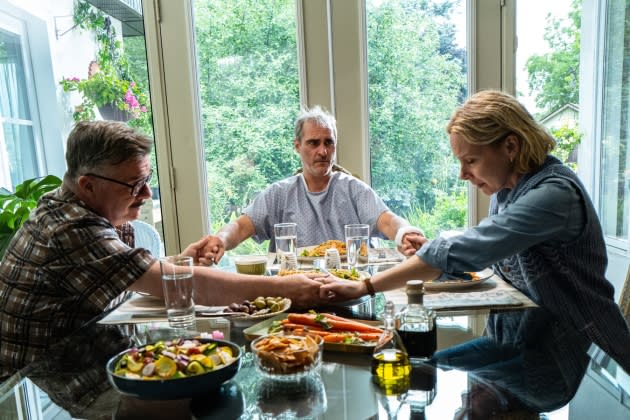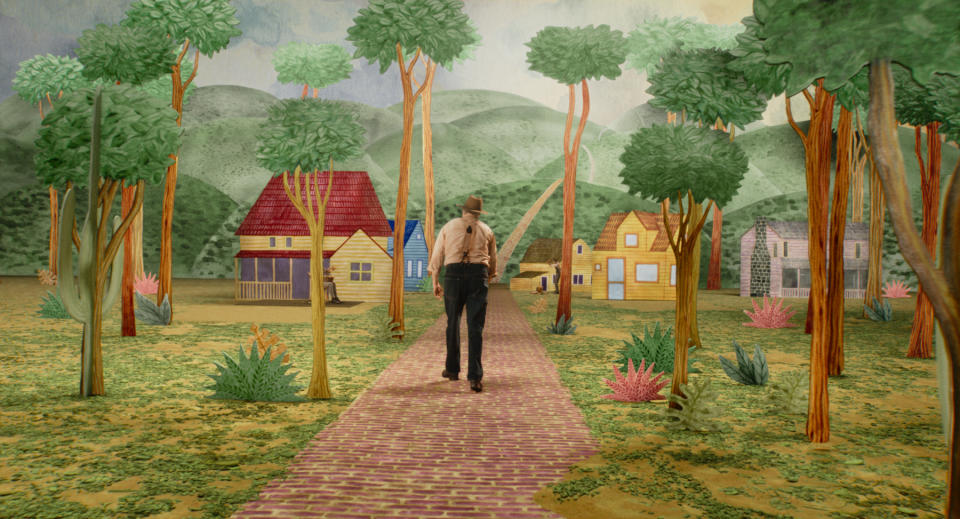‘Beau Is Afraid’ Is the ‘Citizen Kane’ of Mommy-Issues Movies
- Oops!Something went wrong.Please try again later.
- Oops!Something went wrong.Please try again later.
- Oops!Something went wrong.Please try again later.

“They fuck you up, your mum and dad
They may not mean to, but they do
They fill you with the faults they had
And add some extra, just for you.”
-“This Be the Verse,” Philip Larkin
“A boy’s best friend is his mother.”
–Norman Bates
More from Rolling Stone
Lady Gaga Teases Her Take on Harley Quinn as 'Joker' Sequel Wraps Production
What If the Power Rangers Were French, Horny, and Caused Cancer?
Someone may want to start a Kickstarter for Ari Aster’s therapy bills.
In a mere two films, the 36-year-old writer-director has established himself as a next-gen horrormeister, and a genuine auteur in an age full of throne-seeking pretenders. Hereditary (2018), a family drama dressed up as a satanic-cult thriller (or maybe vice versa), was the kind of out-of-nowhere debut that demanded patience, your full attention, and a steely nervous system. Midsommar (2019) became not only an instantly memeable modern classic but transformed Pagan folk horror into a vehicle for sly gender-studies subversiveness — a Wicker Man dosing its film-bro fodder with fourth-wave feminism. Both movies are eerie, unsettling, as likely to force you into uncomfortable areas of self-reflection as scare you shitless. Both are connected less by genre than by a control freak’s meticulousness and an uncanny sense for what truly haunts us deep, deep in the recesses of our psyche.
Hilarious is not an adjective you’d use to describe either, though both of Aster’s works do have a sense of humor — it’s just the kind that falls on the color scale between “pitch-black” and “the abyss.” Beau Is Afraid, his latest movie, isn’t afraid to blatantly make you laugh out loud this time around. There are too many set pieces wound up to a 120mph level of farce, too many visual gags stuffed into foregrounds and backgrounds, too many goofy bits of business to be mistaken for anything but jokes. (What is a close-up of a TV dinner named O’Loha, combining the “best of Hawaiian and Irish cuisine,” but a throwaway non sequitur par excellence?) Yet it’s also easily recognizable as something that came from the guy who helped define what people now call “A24 horror.” Overwhelming dread is still a key part of the DNA.
Only now Aster has now made something that completely dissolves the line between comedy and horror, the personal and the pathological. Beau Is Afraid may or may not be autobiographical — Aster isn’t saying, nor should he if he ever wants to attend another Thanksgiving dinner. But there are clearly some issues its creator is working through in this epic tale of an Oedipal wreck. And though this may share a certain anything-goes absurdity and deliriousness with another recent A24 hit, the fact that the studio has now given us that Oscar-winner’s evil twin is itself a riotous hoot. This is the anti-Everything Everywhere All at Once. The Daniels’ film wanted to heal generational trauma. Aster’s movie wants to stick its finger in that trauma’s wound and pry it open.
It’s not a coincidence that our introduction to Beau — played by an unhinged, unfiltered, unilaterally brilliant Joaquin Phoenix — is while he’s walking into his therapist’s office. (We were only half-kidding about that Kickstarter comment.) The film itself, however, actually begins with a preamble that includes odd ambient sounds, darkness, and shrieks. We soon realize we’re in the birth canal alongside our tour guide for the next three hours, at the very moment he enters the world. “Why isn’t he crying?!?” his mother hysterically shrieks, before a smack on his feet lets loose the waterworks; he’s only been out of the womb for seconds, and already Mom is freaking out. You get the film’s worldview in a few concise swipes: Life is pain. Love is fear. Maternity is synonymous with anxiety. It’s all downhill after Day Zero.
Back to that psychoanalyst’s coach, where Beau is telling his shrink (Stephen McKinley Henderson) about a recurring dream he has. It involves his mother, Mona (played by both Zoe Lister-Jones and Patti LuPone; it’s complicated) — who happens to be calling him on his cell in the middle of his session. Beau eyes the phone like it’s a vibrating chunk of cancer. “Do you ever wish she were dead?” the therapist asks, to which his patient immediately doth protest too much. Of course he doesn’t! He’s going to visit her tomorrow, on the anniversary of his father’s death. How could he harbor ill will toward her? That’s his mother. She loves him.
This is the Freudian Rosetta Stone that Beau Is Afraid uses as its cornerstone. But first, an urban nightmare! The movie is divided neatly into four acts, and it’s not a stretch to say that Act One is one huge, broad, formalistic flex. Beau lives in a corner apartment on Skid Row, in the middle of a downtown Bosch painting come to life; the fictional city is named Corina, but it closely resembles what you imagine New York City looked like in the mind of Travis Bickle and Bernhard Goetz. It could be Anyhell, U.S.A., populated by poverty-line archetypes that Aster films like Bowery bums and/or the walking dead. Beau will eventually lose his keys, his apartment, his financial stability, most of his sanity and, thanks to a speeding soup truck, almost his life on this set-designed block.
What sets everything in motion, however, are two phone calls. One is to his mom, telling her he can’t make the trip. You can hear the disappointment in her voice, feel the venom of guilt working its way through Beau’s bloodstream as he keeps apologizing and the camera slowly creeps toward him. The second one occurs the next morning, in which a UPS driver informs him that a chandelier has fallen and crushed his mother’s head.

What follows is an odyssey of sorts, in which Beau must make it to the funeral — there’s a stipulation that she can’t be buried until he gets there, and the clock is ticking — or die trying. Our injured hero is forced to make a pit stop in the house of a suburban couple (Nathan Lane and Amy Ryan), who have taken him in as a surrogate son; they lost their own boy, a soldier, in a military skirmish and have made their home a shrine. He’s terrorized by a teenage social-media sociopath (Kylie Rogers) and stalked by a PTSD-suffering veteran (Inglourious Basterds’ Denis Ménochet). An encounter in the forest with a theatrical troupe turns everything into a fairy tale, complete with Grimm undertones and meta-overtones. There’s also the matter of a woman named Elaine (Parker Posey) that Beau saw in a news report, who may be the same Elaine he met once upon a time, on a cruise with his mom, when they were adolescents and she kissed him and asked him to wait for her, for as long as it takes….
It’s a lot, and Aster keeps throwing more and more at you — not just because he can, but in the name of servicing an abundance of ideas percolating in his brain. If you can accuse Beau Is Afraid of anything, it’s that the movie occasionally suffers from the ambitiousness of its author; that whole first act is a virtuoso piece of filmmaking (if admittedly a little queasy in its caricaturing) that runs the risk of simply bowling viewers over rather than contextualizing or moving things forward. Ditto a play within the film that weaves in animation, arts-and-crafts aesthetics, and Greek tragedy before turning itself inside out, transforming into a parable about the nonstop panic attack that Beau calls life. There’s a lot of Big Cinema Energy pouring out of the screen, which alternates between thrilling and exhausting. Mostly the former, thankfully, yet you can feel where this fit-to-burst tableau of trauma takes a detour into Look-Ma-Check-This-Out territory.
Which may be apropos, given how the Ma factor plays so heavily into the psychological unburdening happening before us. There are two things that keep the momentum going even when the sound and the fury — definitely the fury — become deafening. One is Phoenix’s performance, which is incredible even by his high standards. He’s turned abstractly damaged men into his strong suit, and seems to need to spill 110-percent of his guts to make it worth showing up. Aster has handed him one hell of character, and the actor has returned the favor by leaving nothing on the table. We’re used to seeing him go to places many fear to tread, to using “naked and afraid” as a starting point and drilling down from there. Beau is a perfect excuse for him to plumb depths that even his previous A-list directors may not have pushed him toward exploring. Not to mention being literally naked and afraid in more than a few sequences. May this be the beginning of a beautiful friendship between two uncompromising artists.
The second is the underlying thrum of how what we inherit from our parents, and the way that a maternal figure in particular can shape how we engage with the world, isn’t always healthy. There is a portrait of a controlling, domineering Mom in Beau Is Afraid so outrageous that Alexander Portnoy might be moved to say, Dude, you need to chill. It’s also one that’s likely to strike a chord with a lot of moviegoers, and not just the male ones. Both Lister-Jones and LuPone know how to couch the monstrous qualities of Mona in a realistic sense of narcissism, weaponized guilt, transference, and rolling over boundaries; LuPone in particular understands Mona’s lashing out at loved ones as a defense mechanism. (She’s so spot-on in her portrayal of this difficult women that you’d have thought it was the role she was born to play, had the award-winning actor not already give us her Norma Desmond, Mrs. Lovett, and Eva Perón.)
All of this is heading toward a WTF pay-off that weaves in sex, violence, a swollen scrotum, Mariah Carey’s “Always Be My Baby,” something lurking in an attic — we’ll only say it’s the monster under your bedsheets and the movie’s grand punchline — and the sense that one day, every humiliating thought we’ve ever had will be used as evidence against us. There are so many baroque touches and visionary flourishes on display that the temptation is to call this the Citizen Kane of mommy-issues movies. Aster is a cinephile, so hopefully he’ll excuse one more comparison: This is his 8 1/2, a project in which a filmmaker marshals all of his powers and chops in the name of bending an art form’s vocabulary and visual powers to express something stream-of-conscious, idiosyncratic, private. The poor sap being subjected to this series of ordeals has every reason to be afraid. The man behind the camera, however, is the one who should be both terrified and exhilarated. He’s given us a self-incriminating masterwork
Best of Rolling Stone

